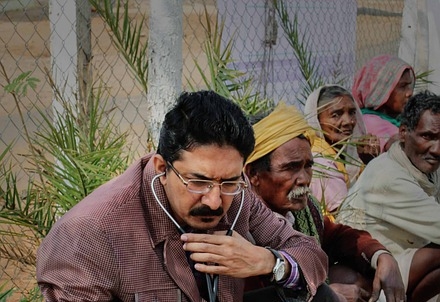In themselves, electoral reforms are not new to the Parliament, the Government, the Press or the Election Commission. For several years, the Commission has been interacting with the government on different subjects requiring reforms. But based on the experiences in the recent 14th Lok Sabha general elections and other issues, the Commission believes that more steps need to be taken quickly.
 In a letter to the Prime Minister dated July 5, 2004, the Chief Election Commissioner T.S. Krishna Murthy has made
a comprehensive case for further reforms. The Commissioner has outlined urgent proposals that have arisen
from the experience of implementing current law as well Supreme and High Court directives. It has also reiterated
proposals that have remained pending with the government.
In a letter to the Prime Minister dated July 5, 2004, the Chief Election Commissioner T.S. Krishna Murthy has made
a comprehensive case for further reforms. The Commissioner has outlined urgent proposals that have arisen
from the experience of implementing current law as well Supreme and High Court directives. It has also reiterated
proposals that have remained pending with the government.
This report summarises the CEC's communication the Prime Minister.
Affidavits declaring information about candidate
Disclosures now Mandatory
These two sets of affidavits often result in confusion. Also, it has been observed that candidates leave some of the columns blank, or give grossly under-valued information, especially about their assets. For furnishing wrong information or concealing information, the current punishment includes imprisonment for six months or fine, or both.
CEC: Only one form of affidavit should be necessary that contains all the vital recommendations. Form 26 should be amended with the inclusion of a further column in the format about the annual declared income of the candidate for tax purpose, and his profession.
In order to protect the electors' right to information, the punishment here should be made more stringent--a minimum of two years, and doing away with the alternative clause for fine.
Criminalization of politics
A person is disqualified from contesting election only on conviction by the court of law.
CEC: The law should be amended to provide that any person who is accused of an offence punishable by imprisonment for five years or more should be disqualified from contesting election even when the trial is pending. This is provided that charges have been framed against him by the competent court. Persons found guilty by a Commission of Enquiry should also stand disqualified.
As a precaution against motivated cases by the ruling party, only those cases that were filed prior to six months before an election would lead to disqualification.
Restriction on number of seats from which one may contest
A person can contest a general election or a group of bye-elections or biennial elections from a maximum of two consistencies. If s/he wins from both, they vacate the seat in one constituency. The consequence is that a bye-election is required from one constituency, involving extensive efforts and expenditure.
CEC: A person should not be able to contest from more than one constituency at a time. However, if the legislature wishes to retain the current provision, then the candidate who wins from two seats--resulting in a bye-election--must deposit in the government account an appropriate amount of money for the expenditure of the bye-election. The amount could be Rs.5 lakhs (10 lakhs = 1 million) for State Assembly and Council election, and Rs.10 lakhs for election to the House of People.
Prohibition of surrogate advertisement in print media
Surrogate advertisements appear in print media, especially newspapers, for and against particular political parties and candidates during election period. This is despite the fact that the law requires any election pamphlet or poster to have the names and addresses of its printer and publisher. The expenditure of such ads has to be added to the account of election expenses of the candidate, and must have the sanction of the candidate. The surrogate ads defeat the purposes of these provisions of law.
CEC: Amendment of the existing laws to the effect that the name and address of the publisher must be given, even in the case of any advertisements/election matter for or against any political party or candidate in print media (during the election period).
Negative/neutral voting
The Conduct of Election Rules, 1961 provides that an elector may refuse to vote after he has been identified and necessary entries have been made in the Register of Electors and the marked copy of the electoral roll. But here, the secrecy of voting is not protected as the polling officials and the polling agents in the polling station get to know about the decision of such a voter. Also, in the Electronic Voting Machines, the candidate does not have the option of negative voting.
CEC: The ballot papers and the particulars on the ballot unit must have provision for a column that states None of the above so that the voter can reject the candidate if he chooses so.
Compulsory maintenance of accounts and audits for political parties
Political parties must prepare a report of contributions received by them in excess of Rs.20,000.
CEC: Political parties must be required to publish their accounts (at least abridged versions) annually for information and scrutiny of the general public. Hence, maintenance of such accounts and their auditing by agencies approved by the Comptroller and Auditor General is a pre-requisite.
Government-sponsored advertisements
On the eve of elections, the Central and various State Governments embark on an advertisement spree in the guise of providing information to the public. The Model Code of Conduct for the Guidance of Political Parties and Candidates prohibits such advertisements at the cost of the public exchequer during the election period. However the Model Code of Conduct comes into operation only from the date on which the Commission announces an election. Advertisements released prior to the announcement of elections cannot be prohibited thus.
CEC: Where any general election is due on the expiry of the term of the House, advertisements of the achievements of the government--either Central or State--should be prohibited for a period of six months prior to the date of expiry of term. In case of premature dissolution, the prohibition should come into effect six months prior to date of dissolution.
Banners and hoardings in public places, depicting achievements of governments, should also be banned if possible. Otherwise, there should be specific provisions that name or symbol of any political party or photograph of any leader of the party should not appear.
Ban on transfers of election officers on the eve of elections
As soon as a general election/bye-election is due in any Parliamentary or Assembly Constituencies, transfers of election officers are often made on grounds other than administrative exigencies. This disrupts the arrangements then underway for conducting smooth elections. In 1998, the Commission had asked that such transfers should not be made without the concurrence of the Commission.
CEC: In case of a general election/bye-election, there should be a ban on transfers for the period of six months prior to the date of expiry of the term of the House concerned or the date of the dissolution of the House (in case of premature dissolution).
Common Electoral Rolls for National and State elections
The Election Commission is assigned with the superintendence, direction, and control of the preparation and revision of electoral rolls for elections to the House of the People. The provisions of the Representation of People Act apply in this case. For the elections to the local bodies, the authority has been entrusted to the State Election Commissioners, and regulated by the respective state laws. Most of the State laws provide that the electoral rolls prepared by the Election Commission should be the basis for the same at the local level. Some states provide that the Parliamentary and Assembly rolls be adopted in toto for local bodies elections. Some others say that they are to be adopted only as the draft rolls and then modified. At times, even the qualifying dates for the Parliamentary/ Assembly rolls and local body rolls are different.
This not only creates confusion among the electors because their names may be present in one roll but absent in the other, or vice versa, but also results in duplication of effort and expenditure.
CEC: Common rolls for all elections will give us huge national savings. The Parliamentary/Assembly rolls should be adopted and rearranged for local elections by the method of Cut and Paste', according to the wards or polling areas of the local bodies. (A CEC proposal on this already pending with the government.)
Simplification of procedure for disqualification of a person found guilty of corrupt practice
CEC: The existing system in which there is a flexibility in the quantum of punishment to be meted out to a candidate found guilty of corrupt practice should continue. Thereby, the nature and the gravity of the corrupt practice committed must be regarded, and a uniform automatic disqualification for six years for all those found guilty may not be correct.
This is because what is termed as a corrupt practice in an election scenario may vary from what is extremely objectionable to a small technical infringement. For example: a candidate using a cycle rickshaw or a three-wheeler or his own car to ferry a handful of voters commits, technically speaking, the same corrupt practice as a candidate who hires fleets of cars, trucks, and trolleys. But both these candidates cannot, and should not, be put on par in the matter of quantum of punishment.
What is of utmost importance is that a decision on such questions of disqualification be expedited, as the period of disqualification in such cases cannot exceed six years from the date of the High/Supreme Court order.
Also, the process of submitting cases of disqualification to the President of India by the Secretary General of the House of the People or the Council of States, and the Secretary of the State Legislative Assembly or Council must be simplified. This can be done if the Secretary to the Election Commission is specified as the authority to submit such cases to the President. (A CEC proposal is already pending with the government.)
Making of false declaration in connection with elections to be an offence
CEC: Making of any false statement or declaration before the Election Commission, Chief Electoral Officer, District Election Officer, Presiding Officer, or any authority appointed under the Representation of the People Act, 1951, in connection with any electoral matter should be made an electoral offence. This refers to declaration or statement in connection with the preparation/revision of electoral rolls or inclusion/exclusion of any name in/from the electoral roll. (A CEC proposal is already pending with the government.)























